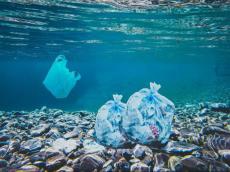|
|
TODAY.AZ / World news
Japanese scientists develop plastic that can be dissolved in seawater in matter of hours
05 June 2025 [08:00] - TODAY.AZ

By Alimat Aliyeva
Japanese scientists have developed a revolutionary plastic that dissolves in seawater within hours, offering a promising solution to the growing problem of ocean pollution and its devastating impact on marine wildlife.
Researchers from the RIKEN Center for Research on New Materials and the University of Tokyo report that their newly engineered material decomposes significantly faster than conventional plastics and leaves no harmful residues behind.
While commercialization plans have not yet been announced, project manager Takuzo Aida revealed that the breakthrough has already attracted significant interest from industries such as packaging, which are seeking sustainable alternatives to traditional plastics.
According to forecasts by the United Nations Environment Programme, plastic pollution is expected to triple by 2040, with an estimated 23 to 37 million tons of plastic waste entering the world’s oceans every year — a crisis that threatens marine ecosystems and human health alike.
“Children cannot choose the planet they will inherit. It is our responsibility as scientists to ensure we leave them the best possible environment,” Aida emphasized.
The new material matches the durability of oil-based plastics but uniquely breaks down when exposed to saltwater, reverting to its original chemical components. These components are then naturally processed by marine bacteria, preventing the accumulation of microplastics — tiny fragments that harm aquatic plants and animals and infiltrate the global food chain.
Additionally, the plastic is non-toxic, non-flammable, and its decomposition does not release carbon dioxide, marking a significant step forward in environmentally friendly material science.
This innovation could potentially transform industries reliant on plastic, especially single-use packaging, and help curb the accelerating tide of ocean pollution. Researchers continue to refine the material, exploring possibilities for large-scale production and integration into existing manufacturing processes.
URL: http://www.today.az/news/regions/259669.html
 Print version
Print version
Connect with us. Get latest news and updates.
See Also
- 20 November 2025 [23:19]
Beloved UK dog breeds may vanish - 20 November 2025 [22:47]
Turkiye expands its African sphere of influence with bold Libya shift - 20 November 2025 [21:50]
US approves semiconductor sales to UAE and Saudi Arabia - 20 November 2025 [21:23]
US begins work on new F-47 fighter - 20 November 2025 [20:55]
Justice Minister says terror-free Turkiye is essential for nation’s future - 20 November 2025 [17:16]
Dubai to ease procedures for light travelers - 20 November 2025 [09:00]
Google launches Gemini 3 AI model - 20 November 2025 [08:00]
Japanese scientists link Google AI to stem cell research - 19 November 2025 [21:41]
Shein, Temu, AliExpress toys pose risks to children - 19 November 2025 [09:00]
Azerbaijan leads regional push on Caspian Sea level crisis at COP30
Most Popular
 TRIPP: How Armenian doubts hinder regional breakthrough
TRIPP: How Armenian doubts hinder regional breakthrough
 Baku, Yerevan hold parliamentary meeting in Istanbul
Baku, Yerevan hold parliamentary meeting in Istanbul
 Azerbaijan shapes the South Caucasus transit map and cannot be ignored
Azerbaijan shapes the South Caucasus transit map and cannot be ignored
 Book on Irevan Khanate cuisine presented in Baku
Book on Irevan Khanate cuisine presented in Baku
 Baku steps forward as rising hub in international telecom development
Baku steps forward as rising hub in international telecom development
 Azerbaijan’s accession reshapes future of regional unity in Central Asia
Azerbaijan’s accession reshapes future of regional unity in Central Asia
 Margot got into a scandal: SHE bought ALL her books HERSELF
Margot got into a scandal: SHE bought ALL her books HERSELF
